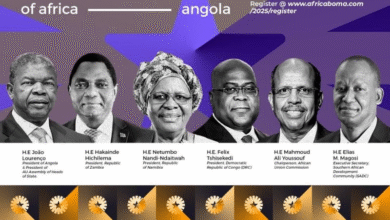Afrobarometer Report : Africans call for greater equity in resource exploitation
Nearly 45% of Africans believe that the exploitation of natural resources does not benefit local communities. This information is contained in a report released in early November 2024 by the Pan-African research network Afrobarometer.

According to this report, titled « Africans Demand Greater Action on Environmental Protection and Regulation of Natural Resource Extraction », about 43% of Africans think that “local communities do not receive a fair share of the revenues from natural resource extraction in their regions.” This document by Afrobarometer presents the findings of a survey conducted with 53,444 people in 39 African countries.
The report highlights disparities in the responses of those surveyed. Thus, 41% of respondents are convinced that communities near natural resource extraction sites on the continent benefit from this activity. Meanwhile, 16% do not know or refuse to give their opinion on the matter.
78% of Malians and 80% of Malagasy believe that local communities receive a fair share of revenues from natural resource exploitation in Africa

In its study, Afrobarometer presented responses by nationality. “78% of Malians and 80% of Malagasy believe that local communities receive a fair share of revenues,” reads the report dated November 6, 2024. Conversely, the Pan-African research network states, “in Mauritius, Morocco, Seychelles, and Angola, only 25% perceive equity in revenue sharing.”
Afrobarometer also found that 45% of Africans believe that the benefits of resource extraction outweigh the drawbacks, compared to 38% who believe the opposite, while 17% remain undecided on the issue. Moreover, according to this network, “over 60% of respondents are convinced of the benefits of natural resource exploitation in Mali, Madagascar, and Liberia, whereas majorities believe the drawbacks outweigh the benefits in Gabon and Uganda.”
The mixed responses in this report reveal that 76% of Africans expect their governments to implement stricter regulations on natural resource exploitation. “These findings reflect the concern of local communities to live in an environment free from the natural and social damages caused by uncontrolled resource exploitation. They believe that these damages could be mitigated by stricter government protection measures,” Afrobarometer emphasizes.
51% of Africans think that local communities are involved in planning and policymaking regarding natural resource extraction
Similarly, at least three out of four Africans want legislation on resource exploitation to be strengthened in 26 of the 39 countries surveyed. Mali, with 90% favorable responses, and Botswana (88%) top the list of countries that want the issue addressed with rigor.
Regarding planning and policymaking for natural resource extraction, 51% of Africans believe that local communities are involved, while 36% do not share this view. Furthermore, according to the report, two out of three Africans are concerned about the disastrous effects of environmental pollution on nearby communities. In order, respondents rank waste management as the main environmental issue in their communities (27%), followed by deforestation (19%) and water pollution (17%).
As for who should be responsible for combating pollution, while 46% of Africans think efforts should be led by ordinary citizens, almost as many (43%) hold governments accountable. According to four out of 10 respondents, governments are fulfilling their mission of protecting the environment, but 51% believe otherwise. As a result, 78% of respondents want these governments to make greater efforts in this area.
To recall, this survey was conducted in a context marked by strong global demand for African mineral resources and forced decarbonization. Hence, there is growing concern about the environmental drawbacks of the activity and equity in the distribution of resource exploitation revenues.
Moreover, Afrobarometer’s report notes that “while natural resource extraction can be a vital source of income and jobs, the divergence of opinions shows that it is also a major source of environmental degradation, particularly in local communities.
Read the report : « Africans Demand Greater Action on Environmental Protection and Regulation of Natural Resource Extraction »







